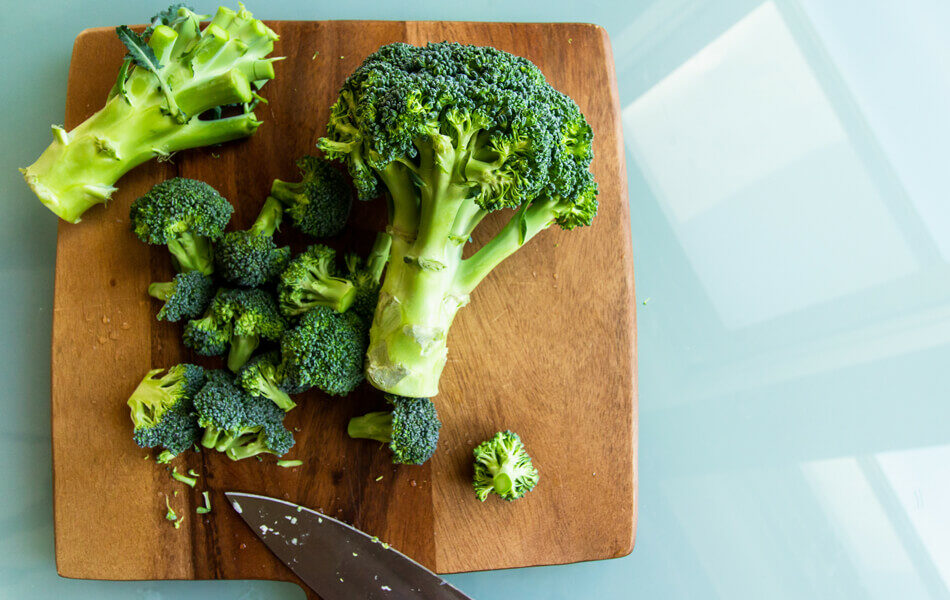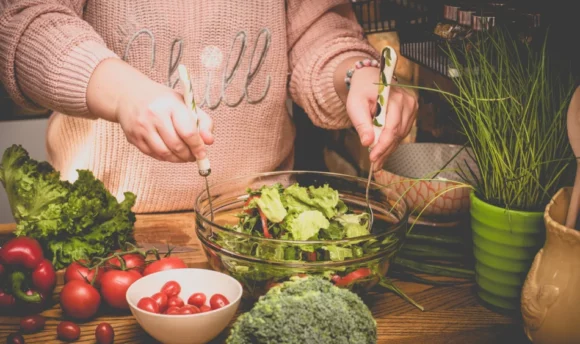Is Broccoli Good for Weight Loss? Why This Veggie Packs a Punch
Cruciferous vegetables are loaded with vitamins and minerals, making them a staple in a healthy diet plan. As a highly nutritious source, you might wonder if eating broccoli will help you shed those unwanted pounds. We bring you all you need to know about the role of broccoli in weight loss.

Broccoli—the green, tree-like vegetable from the cabbage family, has superfood status. It fits easily into a diet plan as it is naturally rich in nutrients that support human health. It is a versatile vegetable that you can eat raw or cooked, in everything from salads to soups.
Broccoli is top of the list if you want to eat healthy food to ensure your body gets sufficient vitamins and minerals. It has a ton of health benefits that keep your body functioning at optimum levels.
Aside from boosting your immune system and potentially fighting cancer risk, broccoli may have one other key benefit—weight loss. So, if your goal is to lose weight and reduce body fat, keep reading as we discuss broccoli for weight loss.
Is Broccoli Good for Weight Loss?
Broccoli can be an excellent diet aid for weight loss as it is a nutrient-dense vegetable. It is low in calories and high in dietary fiber. This healthy food meets the ideal criteria for a weight-loss diet plan because it keeps you feeling full for an extended period without racking up your daily calorie count.
Broccoli is rich in fiber, an essential nutrient for maintaining gut health and regulating blood sugar levels. As dietary fiber passes through the body undigested, it slows digestion, contributing to satiety by keeping you full on fewer calories.
It is a non-starchy, low-calorie vegetable that you can enjoy without worrying about how many calories you’re taking in.
One cup of raw broccoli has less than 30 calories, and a cup of cooked broccoli has 54 calories. Zero-calorie foods are perfect for weight loss because they help you create a caloric deficit without leaving you hungry.
Broccoli is also loaded with phytochemicals—plant compounds that may enhance fat loss, decrease appetite, and reduce body weight.
Sulforaphane, in particular, may have fat-burning properties as it causes fat cells to break down. The sulforaphane present in broccoli sprouts is associated with reduced visceral fat. Losing belly fat is critical for good health as it increases your risk of major health problems.
So, whether you want to lose 5 pounds or several, you can boost your success by consuming broccoli as part of a balanced diet.
Broccoli Nutritional Value per 100g
Broccoli stands tall as one of the most healthy foods on the planet. If you’re still unsure whether you should consume broccoli for weight loss, let’s look at the nutrition facts.
Below is the nutritional content of a 100g serving of raw broccoli.
| Net Carbs | Total Carbs | Fats | Protein |
| 3.87g | 6.27g | 0.34g | 2.57g |
| Calories | Fiber | Sugars | Glycemic Index |
| 39 | 2.4g | 1.4g | 15 |
In addition to fiber, broccoli has a fair amount of protein. Protein is another important macronutrient for weight loss as it also contributes to satiety while helping you lose fat without losing muscle.
It’s also an excellent source of calcium. A higher calcium intake may improve metabolic health and aid fat loss by reducing the growth of new fat cells and encouraging the breakdown of stored fat.
Broccoli has an abundance of vitamin C. Vitamin C has antioxidative and anti-inflammatory properties that may help manage metabolic syndrome.
If you want to lose weight on keto, you don’t need to rule out the broccoli. Although low in fats, broccoli is a staple food on the keto diet because it is low in net carbs. You can safely eat broccoli to help you stay in ketosis.
How Much Broccoli to Eat per Day?
How much broccoli you should eat depends on your personal needs and preferences. Most adults require at least two and a half cups of vegetables per day, including cruciferous vegetables.
Eating one cup of broccoli daily will make up almost half of your recommended daily allowance. So, you may want to meet your daily intake with only broccoli or consume a smaller portion along with other vegetables to ensure variety.
Is It Good to Eat Broccoli Every Day?
Yes, consuming broccoli daily as part of a balanced diet can positively affect your health. It contains plenty of soluble fiber to help you meet your daily fiber intake and lots of vitamins and minerals to help you lose weight and keep healthy.
As with any food, you should balance your intake of broccoli with other healthy foods.
You shouldn’t excessively consume one vegetable as you may miss other essential nutrients. Due to the high fiber content, eating too much broccoli can cause gas and bloating. Eat a healthy dose of broccoli to reap the benefits without upsetting your stomach.
5 Benefits of Broccoli for Weight Loss
If losing weight is your goal, there are plenty of reasons to add broccoli to your weight-loss diet. Here are 5 advantages of broccoli to promote weight loss and boost your general health.
#1 Prevents constipation
Broccoli stops you from getting constipation because of its high-fiber content. Fiber passes through your digestive system undigested. It bulks and softens the stool, making it easier to pass and promoting regular bowel movements.
Cruciferous vegetable consumption can also positively affect the gut microbiota, supporting gut health.
#2 Helps manage blood sugar
Broccoli sprouts can improve insulin sensitivity and insulin resistance, and help lower blood sugar. Additionally, dietary broccoli improves glucose and lipid metabolism markers and may be beneficial for people with type 2 diabetes.
#3 Improves liver health
Dietary broccoli is good for the liver and may protect against fatty liver disease and liver cancer risk due to powerful plant compounds. However, more human studies are required to confirm the relationship between broccoli and liver health.
#4 Supports cells and tissues
This vegetable contains potent antioxidants like vitamin C that support the body’s cells and tissues. Vitamin C content is essential for keeping the cells healthy, supporting the connective tissues, and maintaining the health of blood vessels and bones.
Vitamin C also speeds up the wound healing process as it assists in the production of collagen.
#5 Helps maintain a healthy nervous system
The B vitamins in broccoli play vital roles in keeping your nervous system healthy. Vitamin B is an essential nutrient that supports nerve function and nerve regeneration.
The sulforaphane in broccoli, cauliflower, and other vegetables may have therapeutic effects for disorders affecting the central nervous system.
FAQs
Broccoli may help burn fat as it contains sulforaphane and other phytochemicals associated with fat burning. More research, however, is necessary in this area. Broccoli is a very low-calorie food with several weight loss benefits and may contribute to an overall reduction in body fat.
Broccoli is considered a low-sugar food. A 100g serving of cooked broccoli contains 1.77g of sugar. A 100g serving of raw broccoli has slightly less sugar, with 1.4g. The leafy green is also low in fat and net carbs but high in fiber with moderate protein.
As broccoli is low in calories, you are unlikely to gain weight from eating it. Overeating any food can quickly add up your calories and cause you to surpass your calorie budget. However, thanks to the fiber content, broccoli keeps you full; therefore, you are unlikely to overeat.
A Word From MD
Broccoli is one of the best vegetables to fill your body with goodness. It is low in calories and rich in calcium, iron, phosphorus, potassium, vitamin C, and vitamin K. It may help to prevent some chronic diseases, including heart disease, diabetes, and certain cancers.
If you need to restrict calories and create a calorie deficit to lose weight, look no further than broccoli. Broccoli is a low-calorie, nutrient powerhouse that can contribute to weight loss in several ways, from regulating bowel movements to boosting fat burning.
A diet rich in nutritious, whole foods and regular exercise is key to weight loss.
Living a healthy lifestyle will help you lose weight and secure good habits that support the prevention of weight gain. You could try going for morning runs or daily 2-mile walks to boost the number of calories you burn.
There are many ways to include broccoli in your diet, too. It works well with almost anything, including soups, salads, and pasta. A serving of chopped broccoli alone makes a wonderful crunchy snack.
To keep things simple, cooked broccoli makes a great side dish. For example, you could add steamed or boiled broccoli to lean proteins, and whole grains, such as meat, fish, and brown rice.
Conclusion
Does broccoli help you lose weight?
Yes, it can! While no single vegetable or food alone can drastically reduce your body weight, broccoli can significantly contribute to weight loss efforts and better health. It is one of many foods that carry superpowers to enrich your diet.
Combine a broccoli-rich diet with regular physical activity, and you could soon develop the toned body you’ve always dreamed of.

















































 Select your language:
Select your language: 








